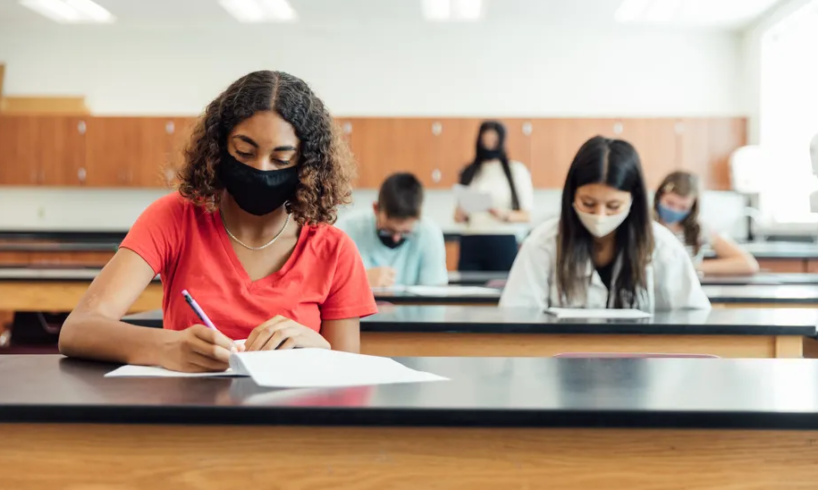
Just 1 in 4 Newark high schoolers who took the Advanced Placement tests passed this year, and the average SAT math score was 472 out of a possible 800.
The test scores, newly released by the district, make one thing clear: The pandemic has left many Newark students academically unprepared for college.
Just 26% of high school students who took the AP tests last school year earned a passing score, the Newark Public Schools data show — down from 46% the previous year. Most colleges grant course credit to students who pass the rigorous AP tests.
Pass rates varied widely by subject. More than 30% of Newark students passed English language and composition, the district’s most commonly taken test, followed by biology, which 26% of students passed. Yet only 6% of Newark students who took the U.S. History test passed, and none of the 46 students who took the AP Chemistry test earned a passing score. (Nationally, 48% of AP test takers passed U.S. History this year and 51% passed chemistry.)
Among district students who sat for the SAT, an exam traditionally used in college admissions, the average math score was 472. That score is nearly 60 points below the “college-readiness” benchmark, which the test maker, College Board, says is associated with passing introductory college courses. The average English score was 469, which is 11 points below the college-readiness cutoff.
Most Newark 11th graders took the PSAT, which determines eligibility for certain scholarships. The average math score was 417 — more than 70 points below the New Jersey average in 2020, and nearly 100 points lower than the college-readiness threshold.
“If you wanted to see ugly, you saw it,” said Superintendent Roger León at a school board meeting Tuesday, where officials shared the test scores and other academic data from the 2020-21 school year.
The high school data comes with major limitations, including very low test participation. Just 12% of the district’s 11th and 12-graders took the SAT last school year — partly because the pandemic made it harder to take the test, but also because most colleges made it optional for applicants to submit SAT or ACT scores. (New Jersey also removed assessments, including the SAT, from its graduation requirements this year.) And only 38% of the small number of Newark Public Schools students who take AP classes signed up for the end-of-course exams.
Tests also give an incomplete picture of student achievement. High school grades are a better predictor of college success than test scores, and more than half of all final grades were As and Bs last school year, according to Newark officials — though some teachers said they faced pressure to inflate grades during the pandemic.
Yet despite their limitations, the test scores attest to the havoc the pandemic wreaked on many students’ lives and schooling, and add to mounting evidence that the pandemic and remote learning slowed students’ academic progress and disrupted their college plans.
“Many students are simply surviving,” said Nefertari Nkenge, national program director at Pathways to College, a nonprofit that helps prepare students in Newark and other cities for higher education. “It was all they could do to keep their heads above water this past year.”
The pandemic has been especially tough on high school students in Newark, which suffered from disproportionately high rates of COVID and unemployment. Many teens reported feeling isolated and anxious while classrooms were closed, while also having to take on adult responsibilities, such as looking after younger siblings and working at fast-food restaurants, grocery stores, and other essential jobs.
Remote learning presented its own challenges. Some students had trouble logging into online classes, or struggled to stay motivated while learning at home. Noah Singman, who teaches geometry and AP calculus at Central High School, said he had to slow the pace of his class due to low attendance and the difficulty of teaching advanced math virtually.
“We made a valiant effort,” he said, but “we did not cover as much of the material as we were supposed to.”
What’s more, many college-prep programs went virtual, leaving some students feeling ill-prepared for the SAT or ACT. The pandemic also disrupted testing; many test centers shut down or reduced capacity, forcing some Newark students to travel to other towns to take the SAT, said Lyndon Brown, who runs a free college-prep program for Newark students along with Wilhelmina Holder.
“A lot of sites were closing down, some without notice,” he said. “It was very chaotic.”
Considering students’ social-emotional struggles over the past year, the financial hardships many families faced, and the shortcomings of online learning, advocates say it’s no wonder that students’ test scores slipped.
“For there to be an expectation that standardized test performance would be anything other than disastrous was unrealistic,” said Nkenge, who noted that low-income students faced structural disadvantages on the SAT even before the pandemic.
The Newark school district has contracted Nkenge’s group, Pathways to College, to offer its college-preparatory program in six high schools this year, up from three in the last school year.
But the district has not put forward a more comprehensive plan for students’ academic recovery. Yvette Jordan, a history teacher at Central High School, said she hopes such a plan arrives soon, as students are sure to need extra help this fall.
“I think that everybody is concerned about learning loss among our students,” she said, “from the superintendent all the way down to the teachers aides.”
This article was originally posted on Newark students struggled on college-readiness tests amid COVID, data shows